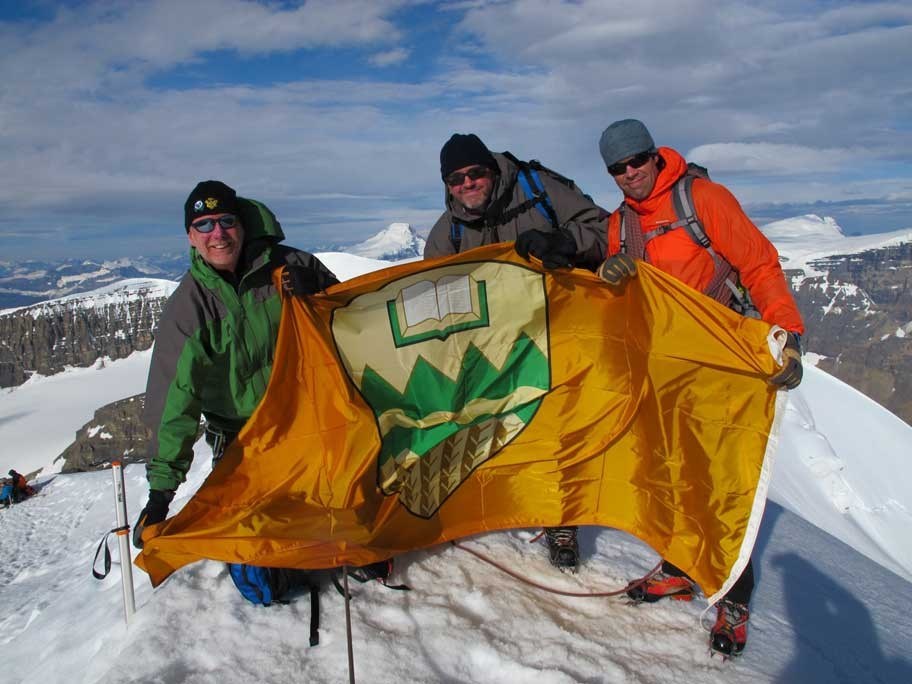If you're keen to learn about science done in the mountains, or about the people who live there, bookmark your calendar now for a conference in December 2012: Thinking Mountains at the University of Alberta. That conference is planned to kick-start a new institute spearheaded by the Canadian Mountain Studies Initiative, based at the same university.
Some 25 scholars spanning everything from glaciology to film studies, ecology to First Nations' history, and human kinesiology to gender studies, have banded together to form what they hope will be an "epicentre for mountain studies" says alpine historian Zac Robinson, one of the initiative's participating faculty. Their intent is to bind together studies of science, anthropology and culture into one giant dialogue about mountains — not just the Rockies, but mountains world-wide.
"We really want to emphasize the interdisciplinary nature of mountain studies: the ecosystem part, the human history part and the world culture part. We're going to invent something new," says participant and gender studies researcher Julie Rak.
The initiative has actually been going for a couple of years, after several University of Alberta professors across different faculties realized that their grad students kept bumping into each other, but had no formal way to communicate. "Like all great things it started after an afternoon in the pub," says Robinson. But it took a while for the initiative to get formal support from one of the deans — Kerry Mummery, dean of the Faculty of Physical Education and Recreation.
"We've got a green light now, so we're scurrying around," says Robinson.
Says Rak: "It's early days ... We don't really have a person in charge yet. Right now we're a coalition of the willing." As for funding, she says: "We have some; not very much right now. But the dean is openly very supportive of us, so we're expecting more resources."
"This is the exciting first step towards the formation of an internationally-recognized institute focusing on the mountains," says Mummery in a University of Alberta story about the initiative.
The initiative's "to do" list for 2012 includes setting up a new undergraduate certificate program, allowing students to get an ad-on to their degree by doing intensive interdisciplinary mountain studies work. Robinson has been running classes like that in the summer for the past few years, allowing students to combine learning about mountaineering skills, parks management, museum archive material and more. "They'd get almost a full semester's worth of credits in six weeks," says Robinson. "Students were always really psyched at the beginning thinking they were getting credit for camping. Then they'd realize there was a lot of work involved." Now the plan is to expand that into a full certificate-granting program.
They're also keen to set up a field site to support those kinds of hands-on classes, perhaps in or near Jasper. Such a site wouldn't need to be in the middle of the wilderness, but would benefit from being integrated with mountain town living. "We don't want to just be a bunch of university people separate from the people who live there," says Rak.
Their goal is to form a full "Institute" out of the initiative in time for the December 11 to 14 conference. An institute would come with a physical office and staff to help with all these efforts.
The idea of an institute for mountain studies isn't new. There's a 40-year-old non-profit called The Mountain Institute headquartered in Washington D.C., with offices in Nepal, Peru, Beijing, China and India, as well as its original home in Spruce Knob, Virginia. According to its website, it aims to "empower communities in the world's great mountain systems through education, conservation and sustainable development." Other famous U.S.-based institutes include the Aspen International Mountain Foundation, the Telluride Institute, and the Colorado-based Mountain Studies Institute, an independent not-for-profit mountain research and education centre celebrating its 10-year anniversary this year.
"A lot of them are non-profit institutes or are studying something specific like watersheds," says Rak. "We want to look beyond that." Being based at a university helps, she says, to gather intellectual heft and resources. But they also intend to forge links with local climbers, guides, international groups, and more. "We don't want to do just scientific work. We want to think a little bit bigger. We want it all."
Robinson says the initiative has been in touch with the University of Montana and the University of Innsbruck in Austria to help initiate collaborative work and study-abroad programmes. "We're scheming up all different ways to get our students into the mountains," he says.
Many of these institutes work in partnership through umbrella organizations like Mountain Partnership and the Mountain Forum. "We've discussed those partnerships; that's something we'd want to do," says Rak.
The Alberta initiative isn't yet famous in mountain studies circles, but it is encouraged. "I haven't heard of this, but I welcome it," says Marcie Demmy Bidwell, executive director of the Colorado-based Mountain Studies Institute. "It will be fun to get to know them better."
"There are great people doing mountain studies all over the place, including UBC," says Robinson. "But there are very few places, and nowhere in Canada, that have brought everyone together with interdisciplinary teaching. That's where we stand alone."
For more information see: www.mountains.ualberta.ca




